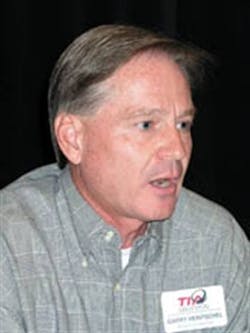What do you get when you bring three of the country's most successful commercial tire dealers together to discuss profitability and the changing face of the truck tire market?
Some of the best advice you'll find anywhere.
That's exactly what attendees at the recent 2005 World Tire Expo received when Garry Heintschel, co-owner of Texarkana, Texas-based Heintschel Tire & Service; Joe Shrader, president of Toledo, Ohio-based Shrader Tire & Oil; and Terry Westhafer, president and general manager of Verona, Va.-based Central Tire Corp., tackled a variety of topics during a panel discussion at the event. They didn't hold anything back.
On working with vendors to procure enough tires:
Heintschel: Negotiate more. If you don't ask, you'll never receive. They can only say "no." Also get close with your customers. Ask them what they'll need in six months or a year. You need to know their needs better than ever.
Shrader: We've added more vendors. We also have looked at buying groups to keep our costs right and acquire more tires.
Westhafer: We've had to expand our vendor base to secure enough product to meet the needs of our customers. We have an individual who manages our inventory and he spends 60% of his time sourcing product. We're also using large-volume wholesalers today, whereas two years ago, we wouldn't.
[PAGEBREAK]
On boosting margins to cover escalating expenses:
Heintschel: There are some customers you have to fire. Gross dollars are what pay your bills. We're selling units for less but our gross profit has grown by several points. There's no chiseling room anymore.
Shrader: We focus more on selling retreads than new tires. By doing this, we've been able to increase our margins.
Westhafer: It's become easier to walk away from a (bad) deal. We've tried to practice this discipline over the years. There's no point in cutting prices and giving tires away. We ask for a reasonable margin and if we can't get it, we need to go somewhere else.
On national account work:
Heintschel: National accounts create negative cash flow. In the right balance it works well. Just watch your balance.
Shrader: We keep our national account business in balance. I see it as a threat to our business if it gets out of hand.
Westhafer: I think the profit is on the service side. If you get an opportunity to get national account business, take it.
On the role that tire service plays in building sales:
Shrader: You need a good tech who knows what he's doing. The salesman is the next key element; he needs to be a solutions provider, not just a peddler.
Westhafer: In our rural markets, most of the work we do is at our own facilities. In urban markets, most work we do is off service trucks. In the metro markets, nobody drives across town to get something done. We try to package (everything) and use it to our advantage.
[PAGEBREAK]
On maintaining service profitability levels:
Heintschel: We're not in this for charity. If I have an account who's been loyal to me, I'll do whatever I can to take care of him. But (when it comes to) those questionable customers who'll be someone else's customer for 25 cents, we're taking the time to weed them out.
Shrader: We just turn down low-margin stuff. Relationships require a win-win. If we can't make money, we won't be around. We need to make our share.
Westhafer: The fleet service side of the business is a constant challenge. We need gross profit to do the work, make a living and help our business grow. You can't afford to give anything away.
On keeping retread margins from shrinking:
Heintschel: What we look for is where we can gain efficiencies at our plant. We look at everything we can do to produce retreads at a lower cost.
Shrader: Sell value not just retreads. The only way to do it is through mileage tests and records -- proving to the guy your product is running (as promised). On the plant side, it's cost containment and increasing efficiencies.
On motivating employees to sell retreads:
Heintschel: I pay them more to sell retreads. I'd rather grow our retread business than the manufacturers' new tire business.
Shrader: Salesmen like the path of least resistance. We pay a percentage of profit so they're motivated to sell retreads.
Westhafer: It's more fun to sell a retread than a new tire. A new tire is a generic product. It's almost become a commodity.
[PAGEBREAK]
On balancing inventories while still keeping enough tires to meet sales goals:
Heintschel: We try not to be brand-conscious as we try to be position-conscious. Major manufacturers have commitments to OE but don't have commitments to the independent tire dealer. We're at the bottom of the food chain.
Shrader: We move a lot of tires around. We make sure we have them where we need them, when we need them.
Westhafer: We're fortunate to have good lines of credit. If a supplier's terms aren't long enough, we have to find another way to buy tires and keep them in stock. Another key to profitability is offering "a differentiated product," says Westhafer. "It's easier to sell. If you have the same thing that everyone else has, you have a commodity. We seek every day to make our product somehow different than our competitors' products."



